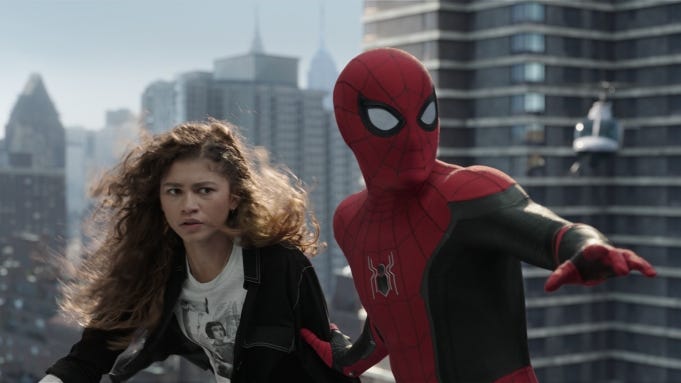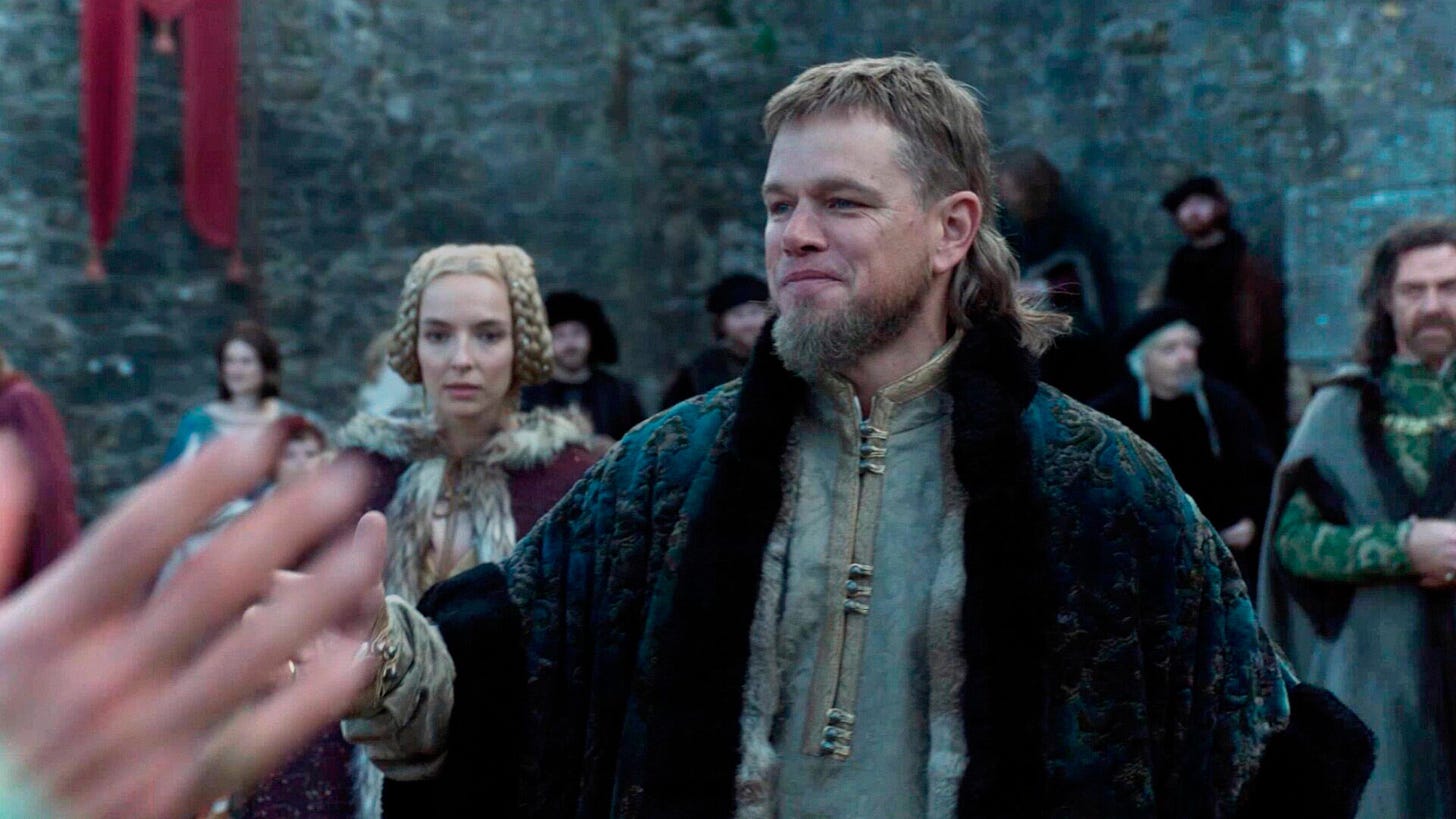Weekly Reel, December 21
News: Golden Globe nominations, Omicron v. "Spider-Man," "The Last Duel" review, and Richard Brody's Best Movies of 2021.
News
The Hollywood Foreign Press Association (HFPA) announced the 2022 Golden Globe nominations. It appears that the HFPA, which came “under pressure” by the entertainment industry for its lack of diversity and unethical practices, is not cancelling the Golden Globes despite the threats. But is anybody surprised that studios, producers, creatives, stars, etc. would choose a shiny award over fighting for ethical industrial change?
Despite concerns over the new Omicron variant, it doesn’t seem to be stopping cinemagoers. The new Spider-Man film generated record-breaking pre-sales for tickets in the Covid era, much more than the latest tentpole films released (No Time to Die, Venom, and Shang-Chi and the Legend of the Ten Rings), and in its opening weekend made a jaw-dropping $260 million. Only Avengers: Endgame made more in its opening weekend. But as can be seen with the box office disappointment of The Last Duel, it’s only younger audiences going back to the theaters at the moment.
The Last Duel (2021, Ridley Scott, UK/USA)
If there was an award each year for a big budget film getting unlucky at the box office from forces beyond the careful planning and control of studio executives, then Tenet would have won last year and The Last Duel this year. Twentieth Century Pictures acquired the rights to the Eric Jager nonfiction book of the same name in 2015 and in 2019 Ridley Scott became interested in directing with Ben Affleck and Matt Damon starring. The latter two were also set to co-write the screenplay along with Nicole Holofcener. During pre-production for the film, the group was uncertain whether Disney, who had just acquired 20th Century Fox, would allow the production to continue so they shopped it around town.
While scrambling to find a studio, Disney quickly agreed to greenlight the $100 million production in November 2019 with Adam Driver and Jodie Comer co-starring alongside Damon and Affleck. Disney announced a Christmas 2020 release date, and that the production would begin late Winter in France and Ireland. A month into shooting from February to March, Covid halted production until September and October. The studio likewise delayed its theatrical release until October 2021. When finally released, The Last Duel arrived in theaters while the crucial 45+ demographic still wasn’t comfortable going to cinemas, which left Millennials and Gen Z as its only box office hope. And to make matters worse, Disney announced The Last Duel would soon be coming out on Disney + and undercut further box office earnings.
After two months of theatrical showings, The Last Duel earned just over $30 million, which means the film lost $70 million plus distribution/publicity costs (I’m guessing between $30-50 million). Although part of the Silent Generation, Scott used Boomerisms during an episode of Marc Maron’s podcast to defend Disney and its publicity while blaming “millennians,” cell phones, and Facebook. He also went out of his way to (unfairly) compare its critical reception to Blade Runner, which at the time critics half-panned and was, according to Scott, specifically called out by Pauline Kael in The New Yorker—Scott framed a copy of the review in his office.
Scott’s comments are (excuse the cliché) both right and wrong. He’s right that Millennials didn’t show up to the theaters but not because they were busy on their cell phones and/or Facebook (his real target is Gen Z but I’m not sure he knows who they are). Maybe it’s that younger audiences aren’t interested in a 2.5 hour rape-revenge litigation duel set in 14th century France with American/British actors sporting silly haircuts co-written by a 49, 51, and 61 year old and directed by an 84 year old. The only detail younger audiences would be interested in is Adam Driver. Scott is wrong in blaming the critics for both The Last Duel and Blade Runner (Kael’s review wasn’t as scathing as he thinks) underperforming at the box office. Covid was clearly the culprit for The Last Duel, and because audiences are over the Game of Thrones sword-and-sandal content high of the previous decade.
[Spoilers forthcoming] In terms of content, The Last Duel doesn’t deliver the same dramatic/cinematic energy as with, for example, Alien and Gladiator. As every critic pointed out, the film follows a Rashomon structure in which someone makes a legal accusation and then we watch the preceding events from different litigating viewpoints. The point is to obfuscate the truth of the crime and let the audience figure it out. But the problem is that as it proceeds from one viewpoint to the next, it’s clear who is telling the truth (or as close as possible to it). The basic plot outline is that Jean de Carrouges (Matt Damon) loses a piece of land, granted by his dowry after marrying Marguerite (Jodie Comer), to his longtime war buddy, Jacques Le Gris (Adam Driver). Furthermore, Count Pierre d'Alençon (Ben Affleck) takes Jacques Le Gris under his wing, who’s the one that forced Marguerite’s father to give over that precious piece of land between betrothment and marriage. Jean de Carrouges therefore feels personally cheated by Jacques Le Gris, which is made worse when Jacques Le Gris rapes Marguerite while Jean de Carrouges is away.
In each perceptive the central figure thinks they’re the protagonist of the story worthy of pathos: with Jean de Carrouges we watch a noble knight and good husband fighting for what is rightfully his while defending his wife’s honor from the opportunistic squire Jacques Le Gris; with Jacques Le Gris we watch a young squire fall madly in love with Marguerite, who shares his intellectual passions but is unfairly with the unromantic and intellectually-deficient Jean de Carrouges. While the first two perspectives feel as if they’re cancelling each other out, we end with Marguerite’s, which shows a dick husband Jean de Carrouges raping her soon after Jacques Le Gris violently raped her. After the King declares a trial by combat, Jean de Carrouges kills Jacques Le Gris, which is a gripping experience not because we care about either of them, but because if Jean de Carrouges loses, then it would mean that God’s judgement deemed Marguerite a liar and the state would have burned her alive. (This film exists is in the same I-can’t-believe-this-is-a-Disney-subsidiary-film category alongside Pulp Fiction).
The content of the film simply fails to match the quality of the form, no matter how contrived the three-perspective-act is. In other words, by Marguerite’s perspective we are in little doubt about the obfuscation of facts and can easily stitch together the truth. What the form does successfully is showing the dark consequences of the masculine tropes of the Medieval period (honor, chivalry, etc.), while at the core is an objectified wife finding happiness through running the estate while her husband is away. But if each of the stories are supposed to cancel each other out, then is Marguerite’s story a fiction the same way in which Jean de Carrouges is heroic and Jacques Le Gris is romantic in their own fantasies? I doubt it.
The Best Movies of 2021 by Richard Brody
Since the turn of the Millenium Richard Brody has been writing about films for The New Yorker. He’s currently the movie-listings editor and writes for The Front Row blog. Given his position at a prestigious magazine and ability to craft some of the finest film reviews since one of his predecessors at The New Yorker (and by-all-account founder of modern film criticism), Pauline Kael, Brody’s opinions have actual power within the industry and the ability to mold the public’s reception. Therefore when Brody writes a list of the thirty-five best movies of the year, it has actual authority (or at least more than the clickbait slideshow website lists).
As a preamble to the list, Brody provides a solid overview of the year:
From an artistic perspective, 2021 has been an excellent cinematic vintage, yet the bounty is shadowed by an air of doom. The reopening of theatres has brought many great movies—some of which were postponed from last year—to the big screen, but fewer people to see them. The biggest successes, as usual, have been superhero and franchise films. “The French Dispatch” has done respectably in wide release, and “Licorice Pizza” is doing superbly on four screens in New York and Los Angeles, but few, if any, of the year’s best films are likely to reach high on the box-office charts. The shift toward streaming was already under way when the pandemic struck, and as the trend has accelerated it’s had a paradoxical effect on movies. On the one hand, a streaming release is a wide release, happily accessible to all (or to all subscribers). On the other, an online release usually registers as a nonevent, and many of the great movies hardly make a blip on the mediascape despite being more accessible than ever.
On the independence of established auteurs and commercialization of outsiders:
When tracking the fortunes of ambitious movies, it’s important to keep an eye on the spread—not, as in sports betting, the handicap of numbers but the aesthetic spread that separates the most original films of the day from prevailing commercial norms. The past two decades have been a time of peaceful revolution in the movies. Established auteurs, from Spike Lee to Martin Scorsese, have found liberation through the rise of independent producers, and ultra-low-budget outsider independents—including Greta Gerwig, Barry Jenkins, the Safdie brothers, Joe Swanberg, the late Lynn Shelton, and others in their orbits—have broken through to the mainstream and shifted the very core of commercial cinema. (Among the marks of the narrowed spread are the overwhelming success of such distinctive movies as “Moonlight,” “Us,” and “Little Women,” and the franchise stardom of Adam Driver.) But these shifts have led to an industry snapback—a reconquest and occupation of studio terrain. The hiring of Terence Nance to direct “Space Jam 2” was a welcome sign of progress; his departure from the project, in July of 2019 (reportedly because of creative differences), was a sign that the winds of Hollywood were pushing back to familiar shores. (The movie, titled “Space Jam: A New Legacy,” came out in July; it isn’t good, but it’s high on the year’s box-office chart.) The double whammy of overproduced mega-spectacles in theatres and audiovisual snackables at home is a sign that, even if theatrical viewing bounces back, movies’ place in the market is likely to be even more tenuous.
In one sense, this pattern is as old as the movies themselves: for every advance, there’s a reaction. In the earliest years of Hollywood, a century ago, a star-driven system gave way to a director-driven one, which studio executives then quickly clamped down on. What emerged was a top-down system that, ever since, has seemed, absurdly, like a natural and ineluctable state of the art. More recently, in the seventies, filmmakers such as Steven Spielberg and George Lucas came along to devise a new pop conservatism, rooted in television and nostalgia, that quickly pushed the most forward-looking of their New Hollywood peers toward the industry’s margins. The lesson is that there is nothing natural, inevitable, or immutable about the Hollywood way of doing things—neither the methods of production nor the dictates of style and form that result. (The absence of a unified and centralized documentary system is why nonfiction, as reflected in this year’s list, has continued its aesthetic expansion uninhibitedly.)
The dilemma facing filmmakers today in regards to the rise of streaming services and decline in theatergoing:
Even before the pandemic, it was becoming tougher for artistically ambitious, low-budget features to get any theatrical release, let alone achieve commercial viability. (Several of the best independent films that I’ve seen in recent years remain unreleased to this day.) But the economics of streaming services present their own peculiar challenges. With theatrical releases, viewers don’t pay for a ticket unless they want to see a movie. Streaming subscriptions, in effect, amount to paying in advance for movies before they are available, which means that platforms have an incentive to deliver the familiar—whether narrowly formatted star-and-genre movies or films by name-brand auteurs, who can easily draw interest. And the widening spread between the most profitable movies and the most original filmmakers risks putting pressure on directors to soften or suppress their most original inspirations, or to filter them into formats, genres, or systems that resist or counteract them.
There’s a danger worse than the studios and their overproduced, over-budgeted methods: a debilitated Hollywood that would relinquish its filmmaking dominance to an even smaller number of giant streaming services. Netflix and Amazon (and, to a lesser extent, Apple TV+) have done respectable jobs of producing and releasing artistically worthy movies, including some that are high on my list. They do it so that they can compete, as players rather than disrupters, with studios and major independent producers for prestigious artists and projects. But if theatrical viewing continues to shrink, taking with it the studios’ preëminence and turning independent producers and distributors into dependent husks, the big streaming services will have much less incentive to finance movies of any significant artistic ambition.
On the uncertain future of film as art:
The economics of any individual movie are irrelevant to the progress of the art form; the pantheon of classics has no connection to the industry’s treasury. Yet the careers of filmmakers are inseparable from their ability to secure access to financing, and the history of cinema is a graveyard of unrealized projects that should serve as a cautionary tale against the squandering of worthy talent. Young filmmakers working outside the system and with scant expectations of getting in are the future of the cinema, which is an art form that doesn’t know what it needs until it gets it. The art advances through a generational takeover—which can happen only when movies seem worth taking over at all. As an avid moviegoer wary of the threat of contagion, I go to theatres cautiously, with careful attention to screenings where there are large numbers of empty seats around me. Yet each empty seat bodes ominously for the future of feature filmmaking over all. The cinema has weathered crises of many sorts, economic and political, but if movies themselves hold any lesson, a rebirth is as likely to resemble a zombie as a phoenix.
Head over to Brody’s original article to see the full list.
Thank you for once again checking out my Substack. Please like it and use the share button to share it. And don’t forget to subscribe to it.






